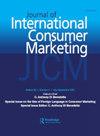Examining the Role of Perceived Source Credibility on Social Media Influencer’s Ascribed Opinion Leadership
IF 2.8
Q3 BUSINESS
引用次数: 0
Abstract
AbstractBuilding on the theoretical framework of the source credibility model, this study aims to investigate how the different dimensions of social media influencer’s (SMI) perceived source credibility, respectively expertise, attractiveness, and trustworthiness impact on influencers’ ascribed opinion leadership, and ultimately affect social media users’ purchase intentions. A cross-cultural analysis focused on the German and Portuguese markets of Instagram users was implemented. Data were collected with an online survey distributed in Germany and Portugal, resulting in a sample of 467 participants, 214 from Germany and 253 from Portugal. Data were analyzed using structural equation modeling with partial least squares (PLS-SEM). Findings confirmed that expertise and attractiveness enhance the influencer’s ascribed opinion leadership. On the contrary, trustworthiness does not influence ascribed opinion leadership. The influencer’s ascribed opinion leadership promotes purchase intention. This study advances influencer marketing literature by deepening our understanding on the influence of online opinion leaders on social media user’s behavioral intentions.Keywords: Expertisetrustworthinessattractivenesssocial media influencersascribed opinion leadership Disclosure statementNo potential conflict of interest was reported by the authors.Additional informationFundingThis work was supported by National Funds of the FCT – Portuguese Foundation for Science and Technology within the project UIDB/04928/2020.研究感知来源可信度在社交媒体影响者的意见领导中的作用
摘要基于信息源可信度模型的理论框架,本研究旨在探讨社交媒体网红(SMI)感知信息源可信度的不同维度(专业度、吸引力和可信度)如何影响网红的意见领导归属,并最终影响社交媒体用户的购买意愿。对德国和葡萄牙市场的Instagram用户进行了跨文化分析。数据是通过在德国和葡萄牙进行的在线调查收集的,共有467名参与者,其中214名来自德国,253名来自葡萄牙。采用偏最小二乘结构方程模型(PLS-SEM)对数据进行分析。研究结果证实,专业知识和吸引力增强了网红的意见领导力。相反,可信度并不影响归因的意见领导。网红的归因意见领导促进了购买意愿。本研究通过加深我们对网络意见领袖对社交媒体用户行为意图的影响的理解,推动了网红营销文献的发展。关键词:专家、可信度、吸引力、社交媒体影响力、描述的意见领导披露声明作者未发现潜在的利益冲突。本研究得到了FCT -葡萄牙科学技术基金会国家基金的支持,项目为UIDB/04928/2020。
本文章由计算机程序翻译,如有差异,请以英文原文为准。
求助全文
约1分钟内获得全文
求助全文
来源期刊
CiteScore
7.60
自引率
6.10%
发文量
29
期刊介绍:
The Journal of International Consumer Marketing examines consumer and organizational buyer behavior on a cross-cultural/national and global scale combining up-to-date research with practical applications to help you develop an action plan for successful marketing strategy development. Business professionals, policymakers, and academics share insights and "inside" information on a wide range of cross-cultural marketing issues, including international business customs, negotiating styles, consumer brand loyalty, price sensitivity, purchasing and leasing, consumer satisfaction (and dissatisfaction), and advertising.

 求助内容:
求助内容: 应助结果提醒方式:
应助结果提醒方式:


